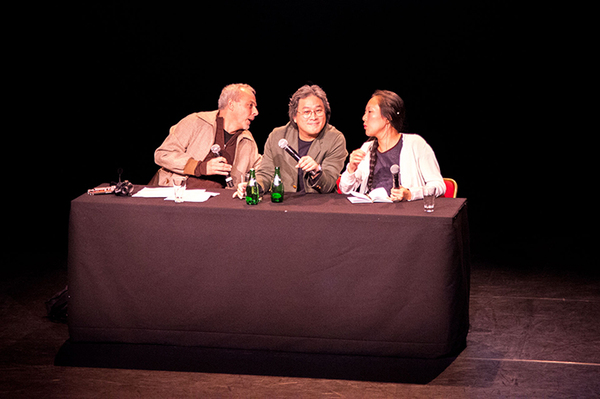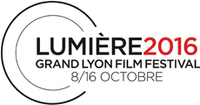Park Chan-wook
A history of violence
PostED ON OCTOBER 14, 2016 AT 11:30AM

© Institut Lumière / Photo Bastien Sungauer
"Unique" is how Thierry Frémaux, quite appropriately, introduced and characterized the highly mysterious South Korean director, Park Chan-wook.
Highlights from a master class from an outer realm…
"There are many very violent elements in my films, and I am always careful not to overdo it. I assure you- I do not enjoy using this component! I could say, rather, that I do not avoid violent subjects. Violence is a topic that cannot be avoided when, like me, one writes about humans, about society. I just think that human beings can be elegant and they can also be very vile, and I want to describe humans with this violence and elegance."
"The vengeance I want to discuss goes beyond satisfying revenge; it's about how, above all, we must have pity and sympathize with the avenger, because revenge is futile. Even a ten year-old child knows that, when he seeks revenge, he doesn't think about the consequences, just getting even. For example, when you lose a child, it is well known that even if one takes revenge, your child will never come back to life. Nevertheless, the being who wants revenge puts all his energy into fulfilling this vengeance. I think that revenge is the action most often used between humans, an act of desperation. This is a key word. This is the biggest factor that differentiates humans from animals."
"I had moments in my life where I was a fan-buff - when I was young, but it did not last very long, not because of a lack of will, but a lack of time. I envy you, audiences of Lyon, seeing all these films during the festival. Since being here, I have spent so much time with my wife in my hotel room, hesitating between so many films - hesitating so much, that, in the end, it's too late to go out!"
"I did not attend a film school. As a child, there was no film library in Korea. I could not educate myself cinematically as I would have liked, but luckily I saw a lot of French films at the French cultural center in Korea. At the time, there was a lot of censorship in my country- you could not see Last Tango in Paris (B. Bertolucci, 1972) for example. I watched all the films I came across; I had no choice at the time. You could not watch Japanese movies because Japanese culture was banned in Korea, and it was the same with films from Russia and the Soviet Union. We were living under a dictatorship."
"Je suis né dans une famille de catholiques et jusqu'à mon adolescence je suis allé à la messe tous les dimanches. Il ne faut pas associer la violence de mes films à mon côté catholique. Mais, quand j'allais à la messe, on me donnait des petites cartes avec des scènes sacrées dessinées dessus. Et comme j'aime l'art je collectionnais ces cartes que je trouvais très belles. Mais ces peintures montraient des scènes de sacrifices et ça me dérangeait, notamment des scènes de tortures et d'exécutions. Imaginez moi, petit enfant, en train de regarder ces scènes d'exécutions, à en devenir complètement obsédé, alors peut-être qu'à cause des catholiques, je suis devenu comme ça ! J'étais très impressionné par Saint-Sébastien en extase, nu avec des flèches plein le corps. Cette image a certainement hanté mon esprit et peut-être mon film Thirst, ceci est mon sang (2009)."
"There are two major problems in Korea: It is a divided country and there is a problem of social classes. I have already dealt with these two issues in my films, including the conflict between social classes, which influenced Lady Vengeance (2005). Koreans lived through war and were able to get out and build amazing economic growth, while imposing democracy at the same time. That makes us proud, but to get there, we had to sacrifice a lot and these developments cannot always coexist with traditional values. As a result, these problems of Korean society are reflected in all my films."
"Je suis souvent attiré par les héroïnes avec des tempéraments assez forts. C'est le cas de mon dernier film Mademoiselle (2016), le dialogue avec les actrices est plus facile. Comme je vis heureusement avec mon épouse et ma fille, je suis plus à l'aise avec des films qui relatent des relations amicales entre les femmes."
"I was born into a Catholic family and until my teens I went to Mass every Sunday. Do not attempt to tie the violence of my films with my Catholic side. But when I went to Mass, they would give me little cards with sacred scenes on them. And since I love art, I collected those cards that I found beautiful. But these illustrations showed scenes of sacrifice that bothered me, especially scenes of torture and executions. Imagine me, a child, looking at these scenes of executions, to the point where I become completely obsessed. So maybe because of my Catholic side, I became like this! I was very impressed with Saint Sebastian in ecstasy, his naked body full of arrows. This image certainly haunted my mind and maybe my first film, Thirst (2009)."
"I am often attracted to heroines with relatively strong characters. This is the case in my last film, The Handmaiden (2016) - the dialogue with the actresses is easier. Since I live happily with my wife and my daughter, I'm more comfortable with movies that tell stories of friendship between women."
Propos recueillis par Virginie Aspiou

